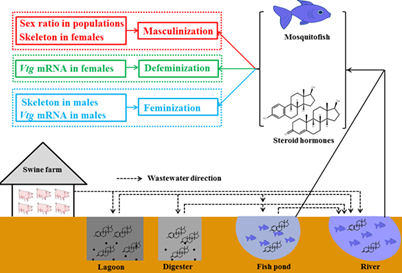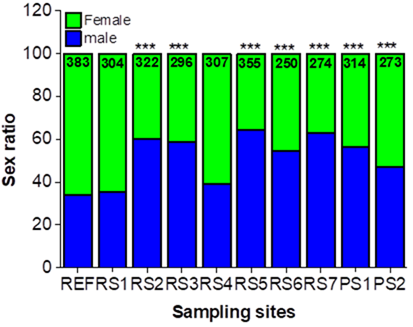Swine Farm Wastewaters Can Lead to Endocrine Disruption of Fish in Eco-Aquaculture
Recently, Dr. HUANG Guo-Yong and others in the Group of Professor YING Guang-Guo, SCNU Environmental Research Institute (SERI), South China Normal University) published a research article " Endocrine disruption in western mosquitofish from open and closed aquatic ecosystems polluted by swine farm wastewaters" in Environment International, a top journal in the field of environmental science. This study showed that swine wastewaters can cause endocrine disrupting effects of mosquitofish. More attention should be paid to the fact that the swine farm wastewaters used in ecological aquaculture also lead to the endocrine disrupting effects of mosquitofish.

China is a big country of swine breeding, and wastewaters from most intensive swine farms are discharged into the surrounding aquatic environments after simple treatment. In some areas such as Guangdong, Guangxi, and some Southeast Asian countries like Vietnam, swine farm wastewaters are often used as fish meals in integrated fish culturing. Swine wastewaters contain not only nutrients, but also various natural and synthetic steroid hormones. Previous studies have reported detection of various steroid hormones (including estrogens, androgens, progestagens, and glucocorticoids) in swine farm wastewaters. The type and concentration level of steroid hormones in wastewaters depend on various factors such as the swine farm scale, the pig type and the wastewater treatment method. Field investigation is often needed to understand the contamination status of steroids. Moreover, the effects of swine wastewaters on aquatic animals remain unknown.
Dr. Huang and others studied the endocrine disrupting effects of swine wastewaters on the mosquitofish in rivers and fish ponds affected by intensive swine farming. The results showed the mosquitofish populations had a significant increase in male/female ratio from 7 sites (including 2 fish ponds) among the 9 sampling sites. The hemal spines of females were masculinized at most sites while the hemal spines of males were feminized at approximately half of the sites (including 2 fish ponds). Significant reduction in vitellogenin (Vtg) mRNA expression was observed in females from 2 sites (including 1 fish pond) while elevated Vtg mRNA expression was noticed in males from 4 sites along the rivers. Redundancy analysis showed that androgens in the water samples were closely related with male/female ratio in the mosquitofish populations and the masculinized hemal spines of females. The findings from this study demonstrated that discharge of SFWs could result in occurrence of both masculinized females and feminized males in mosquitofish population.

Reference:
Huang, G.Y., Shi, W.J., Fang, G.Z., Liang, Y.Q., Liu, Y.S., Liu, S.S., Hu, L.X., Chen, H.X., Xie, L., Ying, G.G. 2020. Endocrine disruption in western mosquitofish from open and closed aquatic ecosystems polluted by swine farm wastewaters. Environ. Int. 137, 105552
Related research:
An early study on the effect of direct drainage of small-scale swine farms on mosquitofish in the receiving water found that the swine wastewaters increased the number of male mosquitofish, resulting in the masculinized anal fins and skeletons of females, and reduced vitellogenin mRNA expression of female mosquitofish. As a result of ban of swine farming, the above effects decrease.
Reference:
Huang, G.Y., Liang, Y.Q., Liu, Y.S., Shi, W.J., Liu, S.S., Hu, L.X., Xie, L., Ying, G.G. 2019. Swine farm wastewater discharge causes masculinization of western mosquitofish (Gambusia affinis). Environ. Int. 123, 132-140.